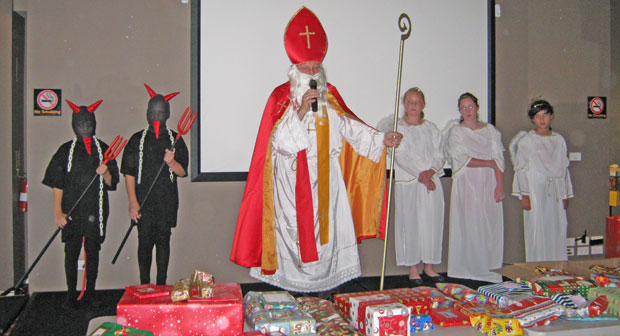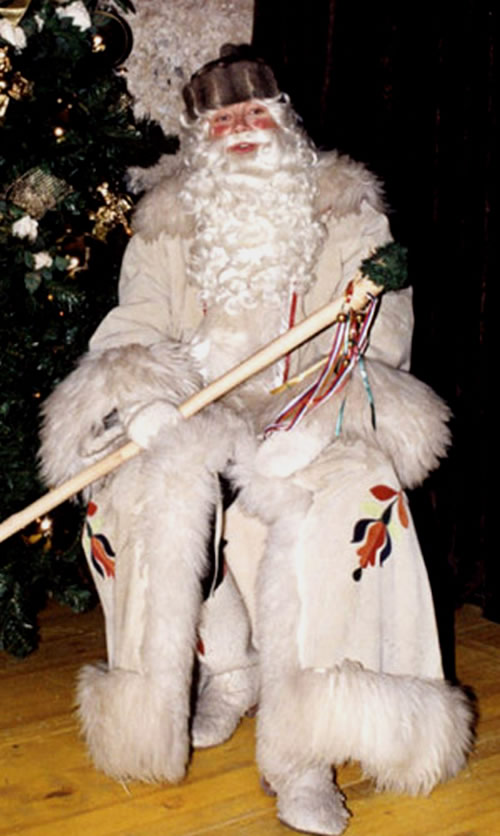In Slovenia, the last month of the year is a very special time as many festivals are on during this time. Most of the cities get decorated with Christmas lights and Christmas trees are lit up as well already at the beginning of December by the latest. Our capital, Ljubljna, is a very popular place to visit as it gets really spectacular as you can check out by clicking on the link below: http://photodohtar.wordpress.com/fotografije/kultura/december-2009/praznicno-okrasena-ljubljana/ . People usually decorate their homes with Christmas lights. Some houses really get that fair-tale sparkling outfit. Children usually also help their parents to bring Christmas spirit into their homes, by cutting out snowflakes, snowmen, Santa from different paper and then they put those up around the house, especially on the windows, so everybody can see. Moreover, in most of the households mothers and grannies start their Christmas baking really soon, so everything is prepared by Christmas Eve for a family get together. In our family, me, my sister and my mother usually do lots of baking in the weekends before Christmas. In that way we end up with lots of different types of cookies to offer together with some tea or coffee for possible visitors. There is another thing most of the families can not spend the Christmas (well, can’t really spend none of the holidays) without, and this is POTICA. It a traditional Slovene rolled cake with nuts (usually walnuts). You can try to make one by following this recipe: http://www.redstaryeast.com/userimages/pdfs/Potica.pdf .
The one thing you are probably very interested into are the good men that bring presents to children in Slovenia. And yes, you are right, there is more than one. There are three of them. The first one is Saint Nicolas, who used to bring sweets, dried fruit and some biscuits to those children who were good throughout the year. However, he has a companion, Parkel, who brings switches to the naughty children and might even take them away. Because of that, not many children are very keen on going out on the night before St. Nicolas day, which is on the sixth of December.
The next good man is Santa. He comes through the chimney and makes sure children get their presents on Christmas morning. As I have said, we have another one who brings presents. He is called Father Frost and he brings presents during the last night of the year, which means kids get another surprise on the first of January after waking up into the new year. Santa and Father Frost deliver presents under the Christmas tree, while St. Nicolas delivers them into the stocking children hang somewhere in their rooms.
During the last month of the year there are a lot of family-get-togethers, especially around Christmas. Christmas is believed to be celebrated with and around family members, which is also one of the reasons I’ll be going home next week, as well as to get the presents from all the three good men :)
The one thing you are probably very interested into are the good men that bring presents to children in Slovenia. And yes, you are right, there is more than one. There are three of them. The first one is Saint Nicolas, who used to bring sweets, dried fruit and some biscuits to those children who were good throughout the year. However, he has a companion, Parkel, who brings switches to the naughty children and might even take them away. Because of that, not many children are very keen on going out on the night before St. Nicolas day, which is on the sixth of December.
The next good man is Santa. He comes through the chimney and makes sure children get their presents on Christmas morning. As I have said, we have another one who brings presents. He is called Father Frost and he brings presents during the last night of the year, which means kids get another surprise on the first of January after waking up into the new year. Santa and Father Frost deliver presents under the Christmas tree, while St. Nicolas delivers them into the stocking children hang somewhere in their rooms.
During the last month of the year there are a lot of family-get-togethers, especially around Christmas. Christmas is believed to be celebrated with and around family members, which is also one of the reasons I’ll be going home next week, as well as to get the presents from all the three good men :)
St. Nicolas&Parkelj

Father Frost














.JPG)
.JPG)
.jpg)
.jpg)
.jpg)
.JPG)
.JPG)

.JPG)
.JPG)
.JPG)

.JPG)
.JPG)
.JPG)
.JPG)
.JPG)




.JPG)
.JPG)
.JPG)
.JPG)
.JPG)
.JPG)

.jpg)